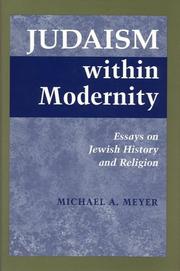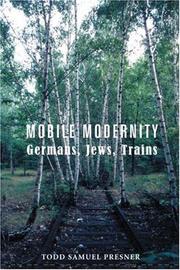| Listing 1 - 5 of 5 |
Sort by
|
Book
ISBN: 9783515109284 Year: 2015 Publisher: Stuttgart Franz Steiner Verlag
Abstract | Keywords | Export | Availability | Bookmark
 Loading...
Loading...Choose an application
- Reference Manager
- EndNote
- RefWorks (Direct export to RefWorks)
Geschichte 1800 - 1945 --- (Produktform)Electronic book text --- Medizingeschichte --- Anstaltsalltag --- Medizin --- Arbeitsrhythmus --- Psychiatrie --- (VLB-WN)9550
Book
ISBN: 9783515105392 Year: 2013 Publisher: Stuttgart Franz Steiner Verlag
Abstract | Keywords | Export | Availability | Bookmark
 Loading...
Loading...Choose an application
- Reference Manager
- EndNote
- RefWorks (Direct export to RefWorks)
Geschichte 1800-1945 --- Osteuropa --- (Produktform)Electronic book text --- Musikwissenschaft --- Musik --- Metamorphosen --- Musikkultur --- (VLB-WN)9590

ISBN: 9780814328743 Year: 2001 Publisher: Detroit (Mich.) : Wayne state university press,
Abstract | Keywords | Export | Availability | Bookmark
 Loading...
Loading...Choose an application
- Reference Manager
- EndNote
- RefWorks (Direct export to RefWorks)
A collection of articles, most of them published previously. The following deal with antisemitism:
Geschichtsschreibung. --- Jews --- Jews --- Jews --- Judaism --- Judaism --- Judaism --- Judaism --- Judaism --- Judaism --- Judaism --- Judaism --- Judaism. --- Judentum. --- Historiography. --- Historiography. --- Historiography. --- Historiography. --- Historiography. --- Historiography. --- History --- History --- History --- History --- Modern period. --- 1900-1999. --- Geschichte 1800-1945. --- Deutschland. --- Deutschland. --- Germany. --- USA. --- USA.
Book
ISBN: 9783805349802 3805349807 3805349815 3805349823 Year: 2016 Publisher: Darmstadt Philipp von Zabern
Abstract | Keywords | Export | Availability | Bookmark
 Loading...
Loading...Choose an application
- Reference Manager
- EndNote
- RefWorks (Direct export to RefWorks)
Der deutsche Wald prägte schon früh die Identität der Deutschen: Der römische Historiker Tacitus schildert in seiner {u203A}Germa{u00AD}nia{u2039} die Gebiete östlich des Rheins wenig vorteilhaft als ?durch Wälder grauenerre{u00AD}gend±. Seine {u203A}Annalen{u2039} berichten über eine Schlacht im ?Teutoburger Wald± zwischen Römern und Germanen, deren Anführer Hermann der Cherusker zum ?Be{u00AD}freier Germaniens± geworden sei. Als dann im Zuge der Befreiungskriege um 1800 Anfänge eines deutschen Nationalbewusstseins entstehen, besinnen sich Dichter und Denker genau auf diesen anti-urbanen, naturnahen Waldmythos. Sie erklären die unverbildete Natur der Wälder zum deutschen Ideal - im Gegensatz zur verbildeten, städtischen Zivilisation Frankreichs. Dieser konstitutive Gegensatz bleibt prägend - bis hin zum Nationalsozialismus. Zechner widmet diesem Urtopos der Deutschen eine eindrucksvolle Studie und zeichnet dessen Ausprägungen von der Romantik bis zum Nationalsozialismus nach. Eine große Ideengeschichte, die erstmals das Identitätskonzept des deutschen ?Waldvolkes± kritisch rekonstruiert. --
Forests and forestry --- Ideology --- Forests in literature --- German poetry --- Forests and forestry in literature --- Knowledge, Theory of --- Philosophy --- Political science --- Psychology --- Thought and thinking --- Forest land --- Forest lands --- Forest planting --- Forest production --- Forest sciences --- Forestation --- Forested lands --- Forestland --- Forestlands --- Forestry --- Forestry industry --- Forestry sciences --- Land, Forest --- Lands, Forest --- Silviculture --- Sylviculture --- Woodlands --- Woods (Forests) --- Agriculture --- Natural resources --- Afforestation --- Arboriculture --- Logging --- Timber --- Tree crops --- Trees --- History --- History and criticism --- Deutsch. --- Forests and forestry. --- Forests in literature. --- German poetry. --- Identität. --- Ideology. --- Kultur. --- Literatur. --- Wald --- Wald. --- 1800-1999. --- Geschichte 1800-1945. --- Allemagne. --- Deutschland. --- Germany.

ISBN: 0231511582 0231140126 9780231140126 9780231511582 Year: 2007 Publisher: New York : Columbia University Press,
Abstract | Keywords | Export | Availability | Bookmark
 Loading...
Loading...Choose an application
- Reference Manager
- EndNote
- RefWorks (Direct export to RefWorks)
Though the history of the German railway system is often associated with the transportation of Jews to labor and death camps, Todd Presner looks instead to the completion of the first German railway lines and their role in remapping the cultural geography and intellectual history of Germany's Jews. Treating the German railway as both an iconic symbol of modernity and a crucial social, technological, and political force, Presner advances a groundbreaking interpretation of the ways in which mobility is inextricably linked to German and Jewish visions of modernity. Moving beyond the tired model of a failed German-Jewish dialogue, Presner emphasizes the mutual entanglement of the very categories of German and Jewish and the many sites of contact and exchange that occurred between German and Jewish thinkers. Turning to philosophy, literature, and the history of technology, and drawing on transnational cultural and diaspora studies, Presner charts the influence of increased mobility on interactions between Germans and Jews. He considers such major figures as Kafka, Heidegger, Arendt, Freud, Sebald, Hegel, and Heine, reading poetry next to philosophy, architecture next to literature, and railway maps next to cultural history. Rather than a conventional, linear history that culminates in the tragedy of the Holocaust, Presner produces a cultural mapping that articulates a much more complex story of the hopes and catastrophes of mobile modernity. By focusing on the spaces of encounter emblematically represented by the overdetermined triangulation of Germans, Jews, and trains, he introduces a new genealogy for the study of European and German-Jewish modernity.
Jews --- German literature --- Technology --- Technology and civilization. --- Civilization and machinery --- Civilization and technology --- Machinery and civilization --- Civilization --- Social history --- Hebrews --- Israelites --- Jewish people --- Jewry --- Judaic people --- Judaists --- Ethnology --- Religious adherents --- Semites --- Judaism --- Intellectual life --- Identity. --- Cultural assimilation --- Jewish authors --- History and criticism. --- Social aspects. --- Philosophy --- Juifs --- Technologie et civilisation. --- Assimilation --- Deutsche. --- Eisenbahn. --- Geistesleben. --- Intellektueller. --- Juden. --- Judentum. --- Kultur. --- Mobilität. --- Moderne. --- Akkulturation. --- Judar --- Identity --- Vie intellectuelle --- Identité --- Acculturation --- 19th century --- 20th century --- Germany. --- Jewish authors. --- Cultural assimilation. --- Intellectual life. --- Intellektuellt liv --- Historia --- BMBF-Statusseminar. --- Geschichte 1800-1945. --- Geschichte. --- 1800-1999. --- Deutschland.
| Listing 1 - 5 of 5 |
Sort by
|

 Search
Search Feedback
Feedback About
About Help
Help News
News